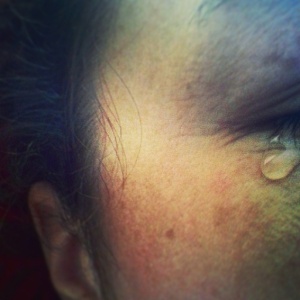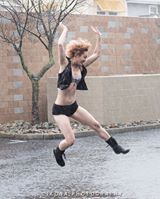When you see me in public I’m putting on a show. Curtains and…action. Seriously. All the world’s a stage.
Especially when you’re sick. And I mean sick.
Whether you have cancer, ankylosing spondylitis (AS), multiple sclerosis (MS), lyme disease, amyotrophic lateral sclerosis (ALS), fibromyalgia, gastroparesis, vitiligo, rheumatoid arthritis (RA), depression, anxiety, post-traumatic stress syndrome (PTSD), etc etc etc, or a mix of more than one extreme disease, you’ll probably relate to the desire for “normalcy” in this post.
Consider this past Friday evening: an hour before an event I could barely stand, my back was spasming, I couldn’t walk the dog, and I was so fatigued I could do little more than roll onto my side in bed.

How do we chronic warriors (yep, a lot of us call ourselves that, and you could too) create, ex nihilo, energy to veil our brokenness in a matter of minutes when someone knocks on our door or when we go to the store or church or anywhere else, despite the wrinkled frames of our grimaces sometimes peaking through (which look deceptively and devilishly like smiles)?
Sometimes I call it adrenaline, other times I call it the work of God. But why would God give me the energy to put on a mask – shouldn’t She want others to see me truly as I am? Isn’t the gospel to help the sick, the friendless, the needy?
If I can’t be needy (for fear of being openly ridiculed and judged for it), then how will people know to help me?
These times I am flat on my back when I should be taking a shower (because the last two days I’ve been too exhausted) or doing laundry or cleaning the litter box or sweeping the floor or washing the dishes or taking the trash out (it smells vile, but I can handle it because my olfactory senses are numb from the pain), or even (gasp) holding a job, I have to force myself to believe I’m truly as perpetually sick as I am. More often than I want to I have to force myself to accept that I JUST CAN’T DO THIS.
During my weakest moments I have learned to see myself as an outsider might. When I remove myself from my own cage of survival is when I can truly see myself for the sickbody I am. When I peer at myself under the microscope and add up the aspects of this disease that affect every decision, every breath, every bill, every drug, every day, every second, is when I can truly be flabbergasted by the courage it takes for me to simply survive.
Simultaneously I grieve that I have no other choice.
I’m painfully aware that my inner rhythm consists of not much more than, “One step forward, two steps back, three steps forward, one step back, breathe breathe breathe, one step forward, one week in bed (oops!), one foot out of bed, one foot in, I made it to the bathroom, one step forward, two steps back.” This is my survival.
All we know is fight. Fight or fall. And even fighting, we often fall. And we *always get back up. (*sadly, not always; suicide is a VERY serious thing that I do NOT take lightly – if you’re feeling like harming yourself please call this National Suicide Prevention Lifeline NOW: 1(800) 273-8255 – the world is a better place with you in it)
It is truly disheartening having to acknowledge our distrust of the bodies we’ve been granted, no matter where our dysphoria is centered. I mean, I stood in line waiting for this body and this is the one I have to drag around? So unfair.
That’s why we [the chronically ill] perform, to escape the reality of our demise and to feel like we can hang with you, the healthy. It gives us a sense of normalcy to mask ourselves for a few hours with the facade of health and joy, for that brief illusion of freedom.
Because we can’t get back in line for a refund, these bodies don’t have warranties, and no amount of money is going to reverse the permanent damage that has already destroyed parts of our insides (and outsides, in many cases).

So much of our lives is centered around our pain, disease management, and fear of what the future brings and means – which is why we snatch any chance we can to act healthy. To perform. To pretend we’re something we’re not. To play. To receive validation that we can still pass as someone who feels as healthy as our invisible diseases often allow us to appear. Our inner ugly can temporarily fade into the background if we can pass for what we want to be – healthy.
So when you see us smiling, playing, working, running, dining…
When you see us participating freely, not whining, not crying, not resting…
Know that we’re occupying a carefully constructed, fragile shell. And the worse our symptoms are that day, the more fantastically desperate our performances become.
Know that we’ve spent years perfecting our makeup, our costumes, our stage presences that keep us going.
Know that inside we’re on fire, we’re wanting to give up, and often screaming at ourselves: “Why are you doing this? You’re overexerting yourself…no, you’re past that…you’re done. Seriously? You’re paying for this later if you’re already hurting this badly. Who’ll understand you now anyway if you give in to the pain and let down your front? They’ll say, ‘But you were having fun, what happened? I can’t tell you’re hurting, you hide it so well. Wait, you’re tired? We haven’t even gotten popcorn yet. I can’t believe this, can’t you just take an ibuprofen? You’re always saying this. You’re faking it. Can’t you take care of this shit at the doctor or at home? You’re 28, you don’t even know what pain is…'”
Know we hide behind a thin veil and we’re terrified of being discovered. At the same time, we wish we didn’t have to keep a wardrobe of walls, veils, acts, excuses in our coat pockets and closets. We desperately wish people would listen to our stories and help us out of our own thick skins we’ve had to create and live beneath as a result of stigma, bullying, judgment, prejudice, and ignorance. We wish we could be out.

Come out with us as allies. Remove your own fear and assume a willingness to listen. And one more step – a willingness to come out in the open and help us share our stories when it becomes too painful for us to do so ourselves.
Share this post, but don’t just share my words. Your words can bridge the gap. Share a story about your journey. Practice coming out with me with your own story.
Let’s share, and let’s listen, so the whole world can be a more receptive place to all our journeys.
If you’re feeling suicidal or like harming yourself please call this National Suicide Prevention Lifeline NOW: 1(800) 273-8255
To learn more about supporting loved ones, look for local support groups, organizations, or online groups (such as facebook) that offer support for specific conditions/diseases/illnesses/diagnoses. For mental illness, NAMI offers wonderful support nationwide (USA). Please feel free to comment below additional services that offer support for people and loved ones of those living with serious illnesses.
For more information about ankylosing spondylitis, the disease I fight, check out the Spondylitis Association of America.
If you found this post useful in some way, please consider supporting my work with a $3 tip at ko-fi.com/beingcharis. Your support will help keep the lights on and make me smile.


Charis, I am sitting here at work in tears. I have been reading your posts for the past few weeks and I cant thank you enough for your writing. You have a way of putting words to exactly how many of us feel.
I have had a recent dx of AS and I am having a hard time with it all. I think that I was undiagnosed for about 20 plus years and now I am feeling angry. Angry because I feel like I have had time to feel good stolen from me. Had I started treatments back then would I be suffering less now? Had someone known what was happening to me would I have had less years of acting fine for people, while wondering why on earth at 20 I have so much pain? That I cant lay on the floor with my baby and have the ability to stand up afterward without feeling like my spine is being ripped from me and my hip wont hold my my weight anymore. Yet asking the drs, I just get told I have some arthritis, or I must have pulled something.
Have I acted for too long, to let people know now how much pain I am actually in? I hate that people always have some advice for me, especially from people who have no idea how bad this is. I am tired of being told once the treatments start working I will feel like a new person. The fact of the matter is, I already am a new person, a broken one.
I woke up this morning to the realization that I will not get better and feeling brokenhearted. The damage is done, there is no cure, no reversing the damage, the pain. No getting back all the things I have missed out on, no getting back the functioning body that I once had. These treatments, are suppose to slow the progression, no one has said it will stop it. No one has said you will be able to stand up straight again, or walk with out pain, or raise your arms over your head again. Your feet and ankles will stop hurting all the time, when you wake up in the morning you wont be so stiff and will be able to move without pain.
Sorry I just ranted a little, I am feeling a little sorry for myself this morning. I am just wondering how long can I keep up this act? Will it ever get any easier, or am I just wasting energy trying?
LikeLike
KJB, I’m so sorry you are struggling so much with this recent diagnosis! I’m glad you were able to let out some steam in your comment – please know it didn’t go ignored. I know nothing can undo the damage and take away the pain, but please know that you are not alone in this. I hope you are able to find a good support network, whether online or in person. If you are in the USA, the Spondylitis Association of America sponsors patient-led support groups around the country.
Keep taking the best care of you possible, KJB. I’m glad to keep writing so you have something that resonates.
LikeLike
Wow that’s exactly how I feel! Thank you for putting it into words!!
LikeLike
You’re welcome. It takes one to know one…
LikeLike
Thank you for writing. Thank you for this post, and your others, as well.
Diagnosed one year ago AS. Two flares… that I have recognized since diagnosis, at least two before that over the last 10 years that I am sure were AS related. (Amazing. I bet that sounds like cake huh?) I am so glad I found you!
LikeLiked by 1 person
Leslwy, I’m so glad you found me too. Please let me know if there are things you think I should write about in the future.
LikeLike
I just learned I have AS and IBS and god knows what else. I’m 27 years old and feel like I’m 500. On top of anxiety disorder and OCD. I’m a special kind of basket case. This sums up my experience so much. Putting face on is SO hard some days. I just want to disappear some days. Why must we all suffer with this so severely? Will normal ever come around?
LikeLike
Hi there, I’m so sorry you are struggling so much. At least….maybe it helps some to know that you aren’t alone in your pain. There are so many of us with multiple severe diagnoses, we need to support each other.
We do have to create our own new normal, and that is tough.
LikeLike
Your writing never fails to encourage and empower. So poetic and real.
LikeLike
Thank you.
LikeLike
Thank you. The public and most family and friends see the mask…the smiles, the participating. When I say I’m tired or I can’t make it, they say, “but you always look so well when I see you”. That’s because I rarely let people see the ‘sick’ me. I appreciate your openness and willingness to share your experience with the world. Thank you from an Ankylosing Spondylitis/Crohn’s sufferer. For finding a way to articulate the world according to the invisibly ill.
LikeLike
Arielle,
Articulating “the world according to the invisibly ill” is such a great way to put it. Thank you for that.
The reason I write is because I hope to give us a voice that is powerful and resonant. When I see that being accomplished (when I get comments like yours), I am motivated to continue my work.
Thank you
LikeLike